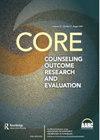An Archival Evaluation of the Effect of Eating and Body Image on Distress and Outcomes at a University Counseling Center
引用次数: 1
Abstract
ABSTRACT The objective of this study was to evaluate the initial general distress levels and unique recovery trajectories of clients who report eating and body image concerns. Data from 3,129 participants were evaluated using one-way analysis of covariance to evaluate differences in initial distress as measured by the Outcome Questionnaire–45, and hierarchical linear modeling to explore recovery trajectories. Clients with eating and body image concerns reported higher general distress at intake (Cohen’s d between 0.48 and 0.95) and were found to recover less quickly. They were also significantly less likely to reach clinically significant criteria for recovery (odds ratio [OR] = 0.69), less likely to achieve reliable positive change (OR = 0.77), and more likely to experience no change or deterioration (OR = 1.33 and OR = 1.29). A thorough initial eating disorder assessment is recommended to aid with treatment planning and addressing eating-disorder-specific symptoms directly and early.在大学咨询中心对饮食和身体形象对痛苦和结果的影响的档案评估
摘要本研究的目的是评估报告饮食和身体形象问题的客户最初的一般困扰水平和独特的恢复轨迹。来自3129名参与者的数据被评估使用单向协方差分析来评估差异的初始痛苦的结果问卷- 45,和层次线性模型来探索恢复轨迹。对饮食和身体形象有担忧的客户在接受治疗时报告的总体痛苦程度更高(科恩系数在0.48到0.95之间),而且恢复得更慢。他们达到具有临床意义的康复标准的可能性也明显较低(优势比[OR] = 0.69),获得可靠的阳性变化的可能性较低(OR = 0.77),无变化或恶化的可能性较高(OR = 1.33和OR = 1.29)。建议进行彻底的初步饮食失调评估,以帮助制定治疗计划,并直接和早期地解决饮食失调的具体症状。
本文章由计算机程序翻译,如有差异,请以英文原文为准。
求助全文
约1分钟内获得全文
求助全文
来源期刊

Counseling Outcome Research and Evaluation
Psychology-Psychology (all)
CiteScore
4.50
自引率
0.00%
发文量
11
期刊介绍:
Counseling Outcome Research and Evaluation (CORE) provides counselor educators, researchers, educators, and other mental health practitioners with outcome research and program evaluation practices for work with individuals across the lifespan. It addresses topics such as: treatment efficacy, clinical diagnosis, program evaluation, research design, outcome measure reviews. This journal also serves to address ethical, legal, and cultural concerns in the assessment of dependent variables, implementation of clinical interventions, and outcome research. Manuscripts typically fall into one of the following categories: Counseling Outcome Research: Treatment efficacy and effectiveness of mental health, school, addictions, rehabilitation, family, and college counseling interventions across the lifespan as reported in clinical trials, single-case research designs, single-group designs, and multi- or mixed-method designs.
 求助内容:
求助内容: 应助结果提醒方式:
应助结果提醒方式:


